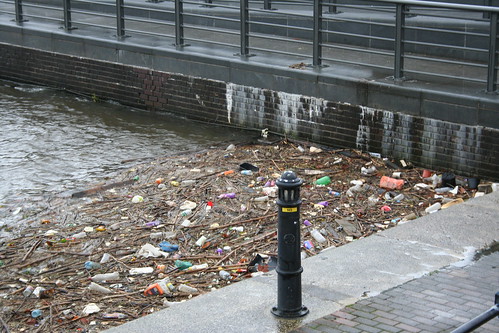So, I’ve seen the first episode of The Newsroom – Aaron Sorkin’s reboot of the West Wing, essentially.I really want to like it. I do. I loved the West Wing, loved the fantasy of smart people who actually get to run the world (or part of it), of serious conversations, and fast-paced lives. The Newsroom is more of the same, but in an environment I know much better – a newsroom.
But still…
First of all, there are the women (and so far only the women) who veer erratically from brilliant and in control to incompetent mess (always predicated by emotional stuff) in a matter of seconds. It’s belittling and infuriating, and in the second episode we got to see both women on the show doing exactly that. Plus, there’s a woman with a PhD in economics and the only thing she’s interested in is whether Will cheated on Mackenzie. Sure. So far, I don’t believe the show actually passes the Bechdel test, since I can’t recall Maggie and Mackenzie actually ever talking about anything other than her relationship, and Sloane and Mackenzie moved very quickly from work to relationships. Oh, and can I talk about names? Three women on the show: two ballbreakers with men’s names, and one little girl who tries to dump her diminutive nickname for a serious one, and fails. Blech again.
And the Indian guy’s the IT specialist/blogger. How rare and original.
Hate hate hate the Charlie Skinner as alcoholic thing (I can’t call it a plot point, because it’s not, yet). Alcoholism is the journalists’ disease and lots of them succumb, but very very few ever make it to the head of news of a major network, not while drinking. It doesn’t work that way now, and I doubt it ever did. I’ve worked with, and for, a number of drunks, and the only one in a senior position was part of a political triumvirate placed at the SABC by the ANC who remained there for reasons which have NOTHING to do with the job (and he’s now on “special leave”). Alcoholics don’t rise to senior positions and stay there because drinking is incompatible with doing the job. Charlie is shown drinking, but never drunk, and that is telling. It’s simply not possible to have one character portray alcoholism and doing a senior management job realistically. As it is, Sorkin’s opted for telling us he’s a drunk rather than showing us, and it’s just a cheap nod to prejudice about journalists (oooh, a show about a newsroom, one of them must be an alcoholic, we need at least two black people, an Indian and a few women – call central casting).
But now we come to the hollow hollow heart of the show. The idea that Mackenzie and Will want to create the kind of news they (or Aaron Sorkin) imagine Edward R Murrow made. This is breathtakingly dishonest. In the USA, the news has always been commercial, always been ratings-driven, and the idea that any channel would allow the kinds of changes they are proposing is so far-fetched that the whole show becomes as fantastical as Game of Thrones.
There is no way Mackenzie (and possibly Will, depending on whether he has producer status as well as anchor) would NOT be dragged into ratings meetings at least once a week, and the data would be sent out to them in any case. The whole fantasy of if you build it, they will come, is lovely, but completely misguided. The West Wing worked because Bartlett was President, and could do what he wanted, within the bounds of the political structure. I suspect the Newsroom won’t work because Will and Mackenzie are much much smaller cogs in a massive mechanism, and can’t act like free agents.
The whole myth that if you make smart news, people will watch is rubbish, and although the critique of the current state of American broadcast news is pithy, the solution is not going to be simply “hire an American who sounds British and let her run things”, believe me. It’s not even whether people will watch, it’s whether advertisers believe they will, and in a climate where more and more channels and media are scrambling for fewer and fewer advertising clients, the station managers would never wait to find out. After the first show, advertisers would be leaving in droves, and that would be it.
The corporate nature of news, the reliance on advertising revenue, the fact that the whole medium’s raison d’etre is the making of profit for the shareholders, none of this can be ignored, or glossed over. The fact that Mackenzie speaks with a British accent, despite being American (and how American – Sorkin makes sure we know she’s as American as Apple Pie and twice as patriotic), is telling: she represents both the BBC and its publicly-funded, intelligent news that is not beholden to financial interests (or the fantasy thereof), although Sorkin can’t say as much, because to imply to an American audience that other people do news better than they Americans would ensure that he never ate lunch in Hollywood again. So, she sounds British (although WTF? I have NEVER met an embassy brat who didn’t sound like their parents, and in any case, her father would never have been Ambassador for her entire childhood – that’s not how ambassadorships work), and she’s been in Afghanistan, which explains why she appears to not know how to work technology (again, WTF? there is nobody more reliant on technology than a foreign correspondent, and therefore nobody who knows more about technology), and so she gets to be the foreigner who explains to the natives how it’s really done (see approximately one third of the movies ever made). Except, she wouldn’t. Because, see above re: corporate nature of news.
And also, because she was a correspondent, not an EP, and they are completely different jobs.(Now starts the technical nitpicking) Sure, people go from one to the other, but not that fast (and not to a panel show), and after years in the field she would have had no idea what she was doing in the gallery, who all those people are, or even much of the jargon. The point at which I realised that a) she knows how to use a Blackberry (a device that outside of the US is only used by teenagers, and never in war zones, since RIM hasn’t bothered to make them work in places without sufficient population density), but can’t avoid sending an email to all staff, twice, in one episode; and b) she knows how to run a panel news show (at least I think it’s a panel discussion, it’s not at all clear what the show is, exactly), and how to run the gallery, what an SOT is, how to create and manage a rundown, during one, despite apparently never having done it before, that I realised she really is the equivalent of Dorothy flying in on a tornado to teach the munchkins how to overthrow the wizard.
On the other hand, she is pretty kickass, and despite talking about taking Maggie shopping and girl bonding over bad boyfriends, I don’t think the show is going to have her weeping into tubs of Haagen-Dasz over Will, and for that, one must be grateful. So, I’ll keep watching and recording, and will probably use chunks in lectures next year. It’s still good, just not perfect.







